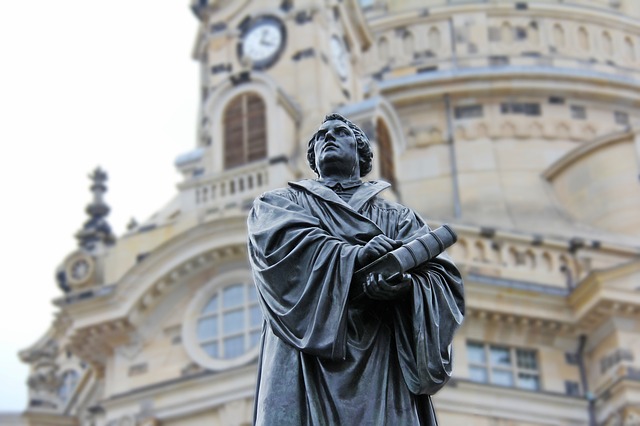Tonight (October 31st, 2019) I will be dressed up as Tin Man with my wife and kids as we hang out with friends and neighbors for a neighborhood block party. We are going as characters from the Wizard of Oz – mainly because we have a dog now and the kids are excited to bring him as Toto. It will be a fun time but what I wear tonight won’t matter much tomorrow. It certainly won’t matter 500 years from now. But October 31st, 1517 changed the course of human history. On that day Martin Luther famously nailed a document containing 95 theses to a church door in Wittenberg Germany and the Reformation began.
God used the Reformation to awaken people to the good news of the gospel — that forgiveness is received by grace through faith and not achieved by our works or purchased by our wallets. We are God’s possession through the finished work of Jesus on our behalf – not our own futile works. The Reformation also brought a renewed understanding that all of God’s people are priests, that all of life can be sacred, and that regular people can and should study the Scriptures. It all began October 31, 1517, the day recognized as the launch of the Reformation. Here are the three statements in Luther’s history-altering document that impact me the most today:
Thesis 1: When our Lord and Master Jesus Christ said, “Repent” (Mt 4:17), he willed the entire life of believers to be one of repentance.
We don’t only repent when we come to faith in Christ, but our entire lives should be marked by repentance. This truth has impacted my personal life and my pastoral ministry significantly. I need to constantly turn to Jesus for grace and I need to help the people I serve know that repentance and grace is still for them. For those who have been Christian for many years, there is a temptation to start thinking that “repentance is something we already did and something for others now to do,” but we must constantly turn from trusting ourselves and turn to trusting Him. In fact, the more we understand God’s holiness, the greater we see our own insufficiency and thus the more we grasp our need to repent. Martin Luther also profoundly wrote, “to progress is always to begin again.” We grow by constantly “beginning again” – by turning to Him again and again for His grace, mercy, and power.
Thesis 62: The true treasure of the church is the most holy gospel of the glory and grace of God.
I love this statement. The treasure of God’s people is the gospel. The true treasure of a local church is not the facilities, the programming, the creativity, the strategy, or the resources. Those can be great tools but they are not the treasure of a local church. The treasure we carry is the glory and grace of Jesus. Without the gospel we have nothing to offer.
Thesis 63: But this treasure is naturally most odious, for it makes the first to be last (Mt. 20:16).
The treasure is beautiful to those who have received it, but it is foolishness and odious to those who do not yet believe. The gospel is offensive because the gospel confronts us with our insufficiency. The cross reminds us that we will never be good enough in our own merit to earn God. We need to be rescued. To receive the treasure of the gospel, we must become like helpless children. To enjoy the treasure, we must admit we are poor. The gospel is only for the poor – and all of us are spiritually bankrupt before God. But to see and admit our poverty is naturally repulsive (odious) because we love to earn, achieve, and stand in our own strength and merit.
This post is sponsored by Southern Seminary, where I better learned to appreciate the impact of the Reformation and where I first read some of the works of Martin Luther. If you are looking to benefit from theological education, I encourage you to check out Southern Seminary.







